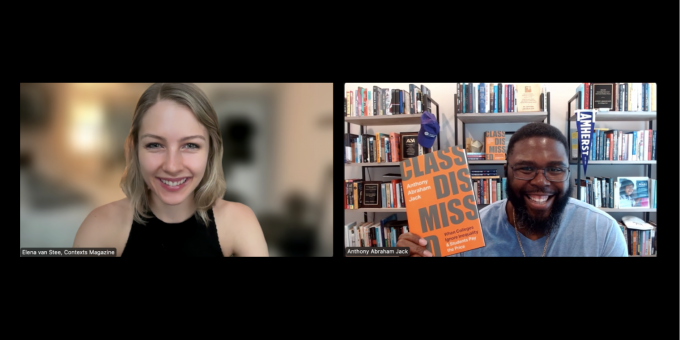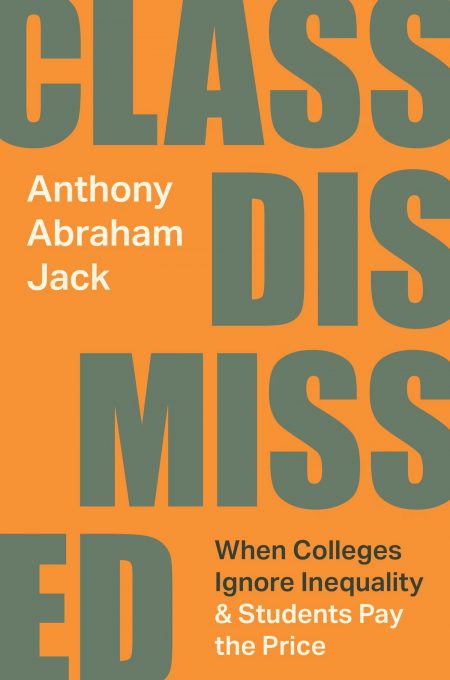
Class Dismissed: Q&A with Anthony Abraham Jack
We are thrilled to welcome Anthony Abraham Jack to the Contexts blog to celebrate the publication of his new book, Class Dismissed: When Colleges Ignore Inequality and Students Pay the Price. In this post, blog editor Elena van Stee chats with Tony about the unequal world college students inhabited before, during, and since the COVID-19 pandemic. They also discuss Tony’s dedication to making his research findings accessible to broad audiences. You can watch the full interview above and find lightly edited excerpts from their conversation below.
Elena van Stee: To start, I want to pose a question to you that I know you’ve posed to many students throughout this study: I want you to return to the morning of March 10, 2020. Where were you when you received the notification that Harvard was asking students to leave campus? And what was your reaction?
Anthony Abraham Jack: I was on campus because that’s where I lived at the time. I was a faculty fellow in one of the undergraduate houses. And I just remember waking up and seeing that email, and I was just like, “It’s here.” I was just trying to figure out what the hell was going on. What was going to happen? What provisions were actually going to be provided for students? Yeah, it was a hard day because I knew it was the right decision, but I also knew it was going to be hard for so many who are already dealing with so much.
EVS: How did your initial concern turn into this formal research project?

AAJ: I was actually going to be working on a book about work among college students—and then COVID hit. So it was a pivot, actually. With the backing of the Harvard Radcliffe Institute and Harvard & The Legacy of Slavery, I was able to interview Black, White, Latino, Native, Asian, and mixed students. I just set out to interview as many students as possible, and my team and I interviewed 125 undergraduates. Sometimes the interview had to be done over two or three sessions; we really just dug into their experience. It was eye-opening and disheartening to sit with students for hours on end and hear about their experiences. It was important for me that this book is not just about COVID-19 but about the very inequalities that COVID-19 exacerbated and that universities were ignoring. So much of this book was about, “Okay, take me through the year or two before COVID hit. Take me to that moment and bring me up to the present day.” I wanted to understand how the inequalities outside the college gates pierce the “college bubble”—a term that I think we should retire.
EVS: The narrative of Class Dismissed is really beautiful; it reads like a story—and that brings me to another question I wanted to ask you, which is: who’s your audience? The narrative strikes me as not-your-average-interview-study.
AAJ: Should I take that as a compliment?
EVS: Oh, it’s the highest compliment.
AAJ: Sometimes I get in trouble for this, but articles and books are different. When I write an article, I know I’m speaking to other academics—specifically, social scientists interested in inequality. When I’m writing a book, my first audience, to be honest, is the students. I’ll never forget the early moments of sharing my work, when students would say, “Your work is the first thing that I’ve read about me that didn’t make me feel bad,” or “Your work helped me come to terms with what was going on in my life,” or “You gave me a vocabulary to talk about my experience.” I will always and forever, when I write about education, put students as the first and primary audience.
I think we should write books to be consumed. That means we should be able to communicate with anybody who might pick up a book. Communicating means that you take that extra step to think about the audience. It’s not just about translating the work; it’s about speaking about complex issues in a way that enables people to engage with them. That, to me, is incredibly important. I have a general rule: If my mama can’t read it, I don’t want to write it. And some people may say, “Oh, that’s so simplistic. That’s childish.” I’m like, “No, writing simply and accessibly is much more difficult than relying on jargon and shorthand to get your point across.”When I wrote this book, I had three people in mind. First, I had the student whose experiences I was chronicling. Second, I had in mind the people in that student’s life who can have a direct impact—whether that’s a professor, a college president, or a dean. Of course, the third group is consumers. That person who’s in the airport and happens to pick up the book, or that person who’s a little bit nerdy who always liked sociology in college and still keeps up with new things—those readers are just as important to me.
And the last thing I will say is this: I love LeVar Burton Reads. I’m so sad that the podcast ended. But after all those seasons, I was introduced to writers who, in such a short period of time, could create an entire world, with not a single word wasted. I discovered that podcast during the pandemic lockdowns, and I now have an entire shelf of books in my house dedicated to the authors I was introduced to through it. I just feel that I’m still growing as a scholar, and hopefully, I can continue to evolve as a communicator and as a writer.
Anthony Abraham Jack is an Associate Professor of Higher Education Leadership at Boston University Wheelock College of Education and Human Development and Inaugural Faculty Director of the Boston University Newbury Center. He is the author of Class Dismissed: When Colleges Ignore Inequality and Students Pay the Price and The Privileged Poor: How Elite College Are Failing Disadvantaged Students. Elena G. van Stee is a graduate student in the Department of Sociology at the University of Pennsylvania. The blog editor for Contexts, she studies culture and inequality, focusing on families, higher education, and the transition to adulthood.
